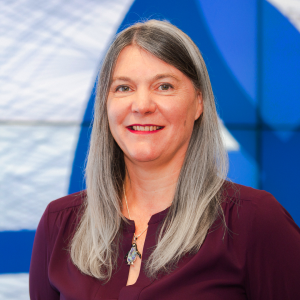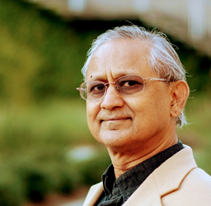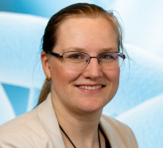Professor Mirjam van Reisen
 Prof. Dr. Mirjam van Reisen holds the chair of FAIR Data Science at the Leiden University Medical Centre and is also Prof of International Relations, Innovation and Care at Tilburg University Faculty of Humanities and Digital Sciences, Department of Culture Studies.
Prof. Dr. Mirjam van Reisen holds the chair of FAIR Data Science at the Leiden University Medical Centre and is also Prof of International Relations, Innovation and Care at Tilburg University Faculty of Humanities and Digital Sciences, Department of Culture Studies.
Prof van Reisen is the Global Principal Investigator of the Virus Outbreak Data Network Africa and Asia. The VODAN network connects 0ver 80 clinics across 8 different countries and enables the FAIR processing and storage of COVID-19 case reports. She is also the chair of the research network Globalisation, Accessibility, Innovation and Care (GAIC). Mirjam van Reisen was a member of the Dutch Advisory Council on International Affairs and Chair of the Development Assistance Committee from 2013-2020.
Professor Francisca Oladipo is a Professor of Computing at the Federal University of Lokoja in Nigeria. She is the executive co-ordinator of VODAN Africa.
Prof. Oladipo serves as the Chief Technical Advisor on the
Joint Admissions and Matriculation Board and is the Facilitator of the Africa Centre of Excellence in Technology and Learning (ACETEL), National Open University of Nigeria.
Keynote: From FAIR Principles to FAIR Data Practices
The increasing prevalence of federated data, combined with the power of FAIR, marks a paradigm shift in the way scientific data is generated and handled. This is especially relevant to the context of Africa, which has often seen researchers extract data and provide no value back to local populations. This new paradigm asks for data visiting, rather than data extraction, which vests safeguards in ownership and only queries specifications for localized aggregation, model building or hypothesis testing.
Within VODAN we are piloting this concept in 84 health facilities within 8 countries, each with different regulatory frameworks and each acting in sovereignty. With data visiting, compliance to local regulations can be ensured and as a result analyses can be routinely performed on a greater variety of population data at an international scale. Now, we not only speak of FAIR in data, but also FAIR in practice: Federable, Actionable, Interpretable and Responsible.
Professor Karin Verspoor
 Professor Karin Verspoor is Executive Dean of the School of Computing Technologies at RMIT University in Melbourne, Australia and a Fellow of the Australasian Institute of Digital Health. Karin’s research primarily focuses on the use of artificial intelligence methods to enable biological discovery and clinical decision support, through extraction information from clinical texts and the biomedical literature and machine learning-based modelling. In addition to roles in academia and government research facilities in the US and Australia, Karin spent 5 years in technology start-ups developing AI and NLP systems.
Professor Karin Verspoor is Executive Dean of the School of Computing Technologies at RMIT University in Melbourne, Australia and a Fellow of the Australasian Institute of Digital Health. Karin’s research primarily focuses on the use of artificial intelligence methods to enable biological discovery and clinical decision support, through extraction information from clinical texts and the biomedical literature and machine learning-based modelling. In addition to roles in academia and government research facilities in the US and Australia, Karin spent 5 years in technology start-ups developing AI and NLP systems.
Keynote: Contrasting Search and Exploration of the Biomedical Literature via the Semantic Web
Classic work in information search has highlighted the need to support exploratory information seeking behaviour in addition to keyword-based lookup. In the context of the early stages of the COVID-19 pandemic, information needs were uncertain and open-ended and not well-served by traditional search tools. To address these needs, we have developed a system we call COVID-SEE (Scientific Evidence Explorer) that leverages natural language processing methods to structure key information in COVID-19-related literature, and facilitates navigation of the literature through a relational lens. I will introduce our approach, and discuss how natural language processing methods combined with semantic web technologies can better support users to explore a complex and growing set of research papers.
Professor Amit Sheth
 Prof. Amit Sheth is an Educator, Researcher, and Entrepreneur. He is the founding director of the university-wide AI Institute at the University of South Carolina. He is a Fellow of IEEE, AAAI, AAAS and ACM. He has (co-)founded five companies, including the first Semantic Search company in 1999 that pioneered technology similar to what is found today in Google Semantic Search and Knowledge Graph, ezDI which developed knowledge-infused clinical NLP/NLU, and Cognovi Labs at the intersection of emotion and AI. He is particularly proud of the success of his 45 Ph.D. advisees and postdocs in academia, industry research, and entrepreneurs.
Prof. Amit Sheth is an Educator, Researcher, and Entrepreneur. He is the founding director of the university-wide AI Institute at the University of South Carolina. He is a Fellow of IEEE, AAAI, AAAS and ACM. He has (co-)founded five companies, including the first Semantic Search company in 1999 that pioneered technology similar to what is found today in Google Semantic Search and Knowledge Graph, ezDI which developed knowledge-infused clinical NLP/NLU, and Cognovi Labs at the intersection of emotion and AI. He is particularly proud of the success of his 45 Ph.D. advisees and postdocs in academia, industry research, and entrepreneurs.
Keynote: Augmented Personalized Health: an explicit knowledge enhanced neurosymbolic dHealth approach to patient empowerment for managing chronic disease burden
Healthcare as we know it is in the process of going through a massive change – from episodic to continuous, from disease-focused to wellness and quality of life focused, from clinic centric to anywhere a patient is, from clinician controlled to patient empowered, and from being driven by limited data to 360-degree, multimodal personal-public-population physical-cyber- social big data-driven. While the ability to create and capture data is already here, the upcoming innovations will be in converting this big data into smart data through contextual and personalized processing such that patients and clinicians can make better decisions and take timely actions. The exploitation of all relevant data, relevant medical knowledge, and explainable AI techniques will also support better communications between patients, clinicians, and virtual health assistants with higher level abstractions (rather than low level data) representing health choices, decisions and actions.
Augmented Personalized Healthcare (APH) strategy we are developing empowers patients with self-monitoring (collecting relevant data), self-appraisal (interpreting data in the patient’s context), self-management (assisting the patient in following personalized care plan to maintain health), to intervention (when the clinical help is needed) and disease progression tracking and prediction (http://bit.ly/AI-APH, http://bit.ly/APH-TED). We currently apply APH using mobile Apps and virtual health assistants for patients managing pediatric asthma (http://bit.ly/kAsthma), mental health, carbohydrate management for type 1 diabetes, hypertension, etc. In this talk, I will describe some of the technical components that incorporate context, personalization and abstraction for supporting advance capabilities such as patient engagement through meaningful question generation, chatbot safety, and explainable decision-making using knowledge-infused learning, a neurosymbolic AI strategy that utilize many types and levels of explicit knowledge.
Dr. Martina Summer-Kutmon is an assistant professor at the Maastricht Centre for Systems Biology (MaCSBio) and the Department of Bioinformatics (BiGCaT) at Maastricht University. Since 2012, she is one of the two architects leading the WikiPathways project – an open, collaborative platform dedicated to the curation of biological pathways. Martina’s research focuses on the development and application of network and pathway-based integrative systems biology approaches for the study of the molecular mechanisms involved in immunology and chronic diseases. As the project leader on the “WikiPathways as a platform for COVID-19 pathway models” project (funded by ZonMw), Martina is actively involved in the international COVID-19 Disease Map project.
Keynote: WikiPathways: Connecting Communities
WikiPathways (www.wikipathways.org) is a community curated pathway database that enables researchers to capture rich, intuitive models of biological pathways. Importantly, pathway models from WikiPathways are also a valuable source for molecular data analysis and the content is provided in different formats including RDF, via dedicated apps like for Cytoscape, and on the network data exchange platform, NDEx. The WikiPathways RDF facilitates pathway curation, data integration and network analysis as also showcased in WikiPathways’ contributions to the effort to curate, map out and analyze the molecular mechanisms of the COVID-19 virus and host interactions as part of the international COVID-19 Disease Map project.


